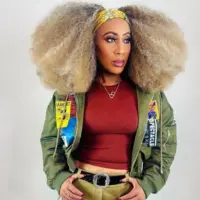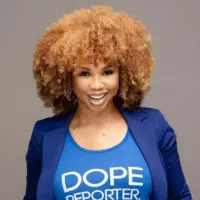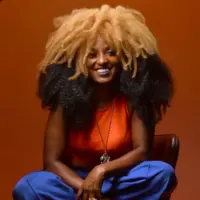
This post was originally published on Defender Network
By Laura Onyeneho
Bridgette Holden always stood firm in her self-expression as a professional through her fashion and natural hair. Growing up as an Army brat, her parents encouraged her to embrace who she is, including her long sandy blonde strands of hair that she would soon realize people in normal civilian life wouldn’t be so accepting.

“I was taught I couldn’t cut my hair because it was a woman’s glory. In the military, I traveled worldwide and interacted with people from different cultures, so my hair wasn’t a big deal,” she said. “I had a culture shock when we moved to Beaumont, Texas, and most of the discrimination I faced was amongst my own people. It fed into some insecurities.”
Holden, who is now a successful publicist and owner of SHE Bridges PR, remembered when she first entered the workforce and felt she had to conform to wearing “long straight 30-inch weaves” working in the media space. It wasn’t until an acquaintance told her that she “looked like every other Black girl in corporate America.”
“It was an unwritten rule. It really wasn’t said verbatim, but you saw other people trying to rock their natural hair, but they [news leadership] used the word ‘distracting’ to describe the hairstyles,” she said. “I’m a rule follower, but I find that line where I can skim it a little bit, and I’m someone who walks to the beat of her own drum, so shortly after that, I left to start my own PR company.”
Hair Representation
Natural hair had no meaningful representation in mainstream media during the 19th and 20th centuries. Black hair did not conform to the Eurocentric definition of “good hair.” Many Black people ventured into chemical options to straighten their hair as one way to move up in society.
It wasn’t until the 1960s that more Black people reclaimed their identity and embraced new ideologies that resisted European aesthetics. While Black hair became a source of pride, many Black people in the community still have deep-rooted beliefs that “manageable hair” helps to blend in with the status quo.

As a reporter at Fox 26 Houston, Chelsea Edwards is no stranger to the public eye. Before she started her career, she decided to go natural after college. She worked behind the scenes as an editor at a television news station and noticed there weren’t enough images of Black women wearing their natural hair because they all wore their hair straight. When she decided to be an on-air reporter, she shadowed reporters on her off days. At that time, she was told that she “had to straighten” her hair if she wanted to be a reporter.
“This was coming from a Black reporter. I was on the fence weighing in on whether I could see myself returning to a life of straightening my hair,” Edwards said. “My hair plays into my personality. I’m free. I can be myself. I decided that if a station would ask me to straighten my hair, that probably wasn’t the station for me.”
Surprisingly, the news stations that contacted her never made her hair an issue. The only criticism came from Black people who felt she had to look a certain way to get ahead. Edwards said she realized that her impact goes beyond wearing her natural hair on television.
“I think my ancestors would be proud of me. It all makes what I do worthwhile,” Edwards said. “One of the compliments I get a lot from people is that I come off authentic. That is a very important way to engage and connect with people.”
Hair Politics
With the recent case of Darryl George, the Barbers Hill High School junior who served more than a month of in-school suspension for wearing dreadlocks, and was sent to an alternative school program for “failure to comply” with several classroom and campus regulations, it is apparent that the policing of Black hair, whether by whites or other Blacks, is still happening.
In September, George’s family filed a formal complaint with the Texas Education Agency and a federal civil against the state’s governor and attorney general, alleging they failed to enforce a new law outlawing discrimination based on hairstyles, the CROWN Act, a new law intended to prohibit “discrimination based on hair texture or protective hairstyle associated with race.
When George returned to Barbers Hill, after spending more than 80% of his junior year outside of his classroom due to the “hair” suspensions, he was immediately suspended again for choosing to continue to wear his hair in its natural state.

For culture workers and community organizers like Secunda Joseph, she operates in spaces where she can comfortably flex her big, bold, and beautiful afro, working for people who look just like her. As the Co-Founder and Director of Smart Media and a primary organizer with ImagiNoir/BLMHTX, she aims to educate, empower, and build coalitions that address issues adversely impacting Black lives in Houston.
In the early 2000s, she decided to do the big chop. She cut all her hair when growing her relationship with God and wanted to be able to accept herself authentically. At the time, she said the process felt uncomfortable because she valued her hair.
“It felt like a sacrifice, and it sounds silly to say because why would it feel that way when it’s your own hair,” she said. “The sacrifice to be who you are. To allow your hair to grow out of your head the way God made it shouldn’t make me feel ashamed.”
She recalled a pivotal moment when she worked for the state as a University of Houston college student and often wore headwraps to work. Her new program manager at the time told her that it was “unacceptable” to wear it in the office, and she was asked not to wear it again. It was the first and only time she had anyone address her in that manner.
“She was a Black woman, and she wanted me to fit into this box,” Joseph said. “I wasn’t afraid to lose my job because I didn’t see where she had any right.”
One lesson Joseph learned from living authentically is that it comes with great sacrifice.
“With justice and equity work, I transform spaces to be equitable for all. Organizations call me to take the lead in these conversations,” she said. “But it costs financially because creating your own lane takes time to build a safety net versus working for corporate where you get a steady paycheck. I hope the CROWN Act will eliminate the struggles of dealing with the repercussions of how society tells us we should look.”















